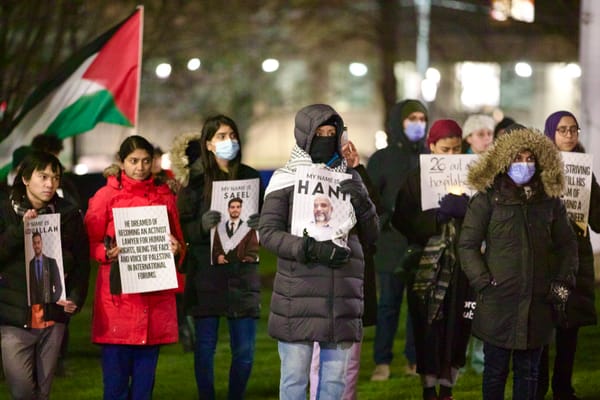On November 26, the federal Liberal Party introduced a new bill that will make it illegal for anyone to provoke healthcare workers into “a state of fear,” and block them, or people whose job is to help them, from doing their work. The announcement came just more than a week after the Canadian Medical Association (CMA) called for such a law, specifically referencing the increased harassment resulting from COVID-19 misinformation being spread.
What has barely been mentioned in subsequent coverage, however, is that the new legislation comes with a maximum sentence of 10 years in prison. While no one should be harassed for doing their jobs, the rapid move toward criminalization, accompanied by an excessive maximum sentence, needs to be roundly condemned.
There’s no question that the pandemic has increased violence within Canadian society. Gender-based violence is endemic, and femicide spiked in 2021, even compared to 2020 numbers. Bus drivers have been spit on and assaulted. Teachers have been reporting an increase in violence in the classroom. Journalists report being targeted to a greater degree than before. Indeed, it would be difficult to find a job that has become safer and more secure during this pandemic that isn’t policing.
But none of these individuals, whether they were murdered or spit on at work, have been given new criminal laws to stop what happened to them from happening to anyone ever again. So, what makes healthcare workers more equal under the law than a grocery clerk?
Certainly, it helps that doctors are held in probably the highest esteem of any profession, and have a salary to accompany that. But also, the pandemic has offered journalists an excuse to give doctors a greater amount of airtime than ever before, talking with them about healthcare way more often than they speak to nurses, personal care workers, respiratory therapists, hospital cleaners or food staff. The higher profile that doctors have been given has increased the amount of hate many of them have experienced. And so, while the Canadian Association of Journalists can call for more police intervention to fight harassment against journalists and see no action from the feds, when the CMA does the same, the Liberals jump into action.
There are two big problems with this, obviously. The first is that doctors aren’t the most at risk for workplace violence. Studies from the Canadian Federation of Nurses Unions found that 61 per cent of nurses reported “a serious problem with violence,” with more than 46 per cent noting they’d been exposed to physical assault at least 11 times over their careers.
The second is that the threat of violence is worse from outside the workplace than within. Personal support workers are in particularly dangerous jobs. They account for more than 16 times of provincial lost hours than police and firefighters, and more claims are made to Ontario’s health and safety insurance board on their behalf than workers in manufacturing and transportation.
In 2019, the federal government’s Standing Committee on Health studied the issue and came up with nine recommendations to reduce violence against healthcare workers, including that the federal government create a pan-Canadian framework to prevent violence in healthcare settings, and that more staff be hired to reduce one of the aggravating factors of workplace violence: understaffing. The committee didn’t recommend that intimidating or harassing healthcare workers be specifically criminalized in the Criminal Code. The only recommendation that related to the Criminal Code was to make violence against a healthcare worker be considered as an aggravating factor in sentencing decisions.
Why did the federal government move so quickly after a half-cocked call from the CMA to make harassment extra illegal rather than implementing their own standing committee’s recommendations? And why would the proposal be accompanied by such a massive maximum sentence?
The individuals who will be charged under this law likely won’t be the pro-COVID protesters who have targeted high profile doctors. While police forces have violently arrested people at encampment protests in cities across Canada, they’ve been mostly hands-off with the pro-COVID rallies, even when they had more than enough reason to clamp down, such as when protesters threw gravel at Prime Minister Justin Trudeau. If law enforcement doesn’t use the powers available to them under the Criminal Code as it is, why would they all of a sudden use these new powers when they come into law?
The people who will be most targeted will be those in crisis and/or already criminalized by Canada’s legal system: Black and Indigenous patients, as well as people who have a lot of contact with the medical system and are fed up, frustrated, and angry with years of insufficient care. And thanks to the doctors calling for more criminalization, there will be a chance that they’ll face even stricter sentences, all while the real drivers of violence against healthcare workers (underfunding, understaffing and a lack of priority from management to take workplace violence seriously) go unaddressed.
I know that we’ve gotten used to giving up our civil liberties during the pandemic, and in a crisis it has been a necessary sacrifice, but it’s critical that we resist attempts to further criminalize and incarcerate people under the illusion of providing safety to those whose job it is to keep us healthy and safe.








Member discussion